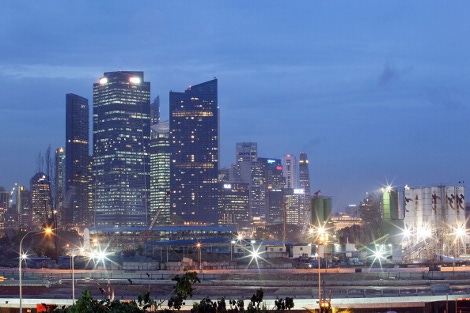Report: Singapore is a $1B Data Center Market and Growing FastReport: Singapore is a $1B Data Center Market and Growing Fast
Groundwork for growth laid, the island nation’s colocation market is booming

The Singapore data center market is booming thanks to the country’s proximity to China, political stability, and a business-friendly regulatory environment. Colocation providers in the island nation made close to $1 billion in revenue in 2014 – a market size projected to surpass $1.2 billion next year, according to a new report by analysts at Structure Research.
The technology market in Asia is growing faster than anywhere else, most of the growth occurring in China. As companies from elsewhere look to expand to Asian markets, while Asian companies expand globally, Singapore, like Hong Kong, has emerged as a data center and network gateway between key Asian markets and the rest of the world.
The Structure report focuses specifically on data center colocation services and counts about 50 colocation providers in Singapore, including providers with their own data centers as well as sizable resellers. Cumulatively, these providers sell colo space in 44 operational data centers today, but there’s a lot of data center construction taking place, and more facilities are going to come online this and next year.
Singapore Data Center Market, By the Numbers:
Number of data center providers: <50
Number of operational data centers: 44
Total critical power capacity: 200 MW
Total data center space: <2 million square feet
Total rack space: 55,000 racks
Total 2014 colocation services revenue: $963 million
Total projected 2016 colocation services revenue: >$1.2 billion
Numbers courtesy of Structure Research
First-Mover Advantage
While it is now competing with neighboring markets for data center business – markets such as Cyberjaya and Johor in Malaysia or Jakarta in Indonesia – Singapore started laying the foundation for a data center market much earlier than other countries in the region did and therefore has some clear advantages, Jabez Tan, senior analyst at Structure who happens to be a native Singaporean, said.
There is robust network and power infrastructure throughout the island, and numerous key submarine cable systems land there, connecting it to Hong Kong and Australia. There’s a diverse enterprise ecosystem in Singapore, including a robust financial-services sector.
“Business ecosystems like the ones Singapore has established take years of time and effort to develop and are not easily replicated, since there are no shortcuts, which is why first-mover advantage is critical and why Singapore has successfully positioned itself as the top data center hub in Asia,” Tan said.
Lay of the Land
Structure splits Singapore into three distinct regions: northern, western, and eastern. Most data centers are in the eastern region. “More than half of data center capacity of Singapore is on the eastern side,” Tan said. The western region has the second-largest colocation data center presence.
There isn’t a whole lot of colocation data center capacity in the northern region, but at least two providers (Global Capacity and 1-Net) are building data centers there. The northern part is also where several US internet giants have built their data centers: Google, Microsoft, and Yahoo, according to Tan.
Aliyun, the cloud services arm of the Chinese internet giant Alibaba, disclosed plans to expand its data center infrastructure to Singapore, among other locations, last week.
Meet the Top Players
The biggest data center provider in Singapore today is the local telco Singtel, which has eight data centers on the island and commands 40 percent market share, according to Structure. Silicon Valley-based Equinix is the second-largest player with three existing data centers and confirmed expansion plans in Singapore.
The third- , fourth- , and fifth-largest players are London-based Global Switch, Singaporean Keppel, and San Francisco-based Digital Realty, in that order.
Among the top 10 colo providers on the island, most are international companies. Only four out of 10 are local, Tan said.
Malaysia: the New Jersey of Singapore
Malaysia is Singapore’s biggest competitor for data center projects. In many ways, Malaysia is to Singapore what New Jersey is to New York City, Tan said. It is a close neighbor with cheaper land, power, and labor. But there are lots of characteristics the Singapore data center market has going for it that Malaysia does not.
Political instability, subpar connectivity, and a sizable gap in terms of educated workforce are all examples of things Malaysia would have to overcome if it were to successfully compete with Singapore for data center construction, Tan explained.
Another obstacle would be Singapore’s data sovereignty laws, which require certain data center workloads and sensitive user data to be stored in the country. These laws will make it difficult for a service provider who wants to sell into the Singapore market (Malaysia’s largest neighboring market) to set up shop in Malaysia.
Scarcity and high cost of real estate will only play in favor of the colocation market in Singapore. “Our research indicates that colocation will be the preferred way forward” as an enterprise data center strategy in Singapore, Tan said.
Read more about:
Asia-PacificAbout the Author
You May Also Like







